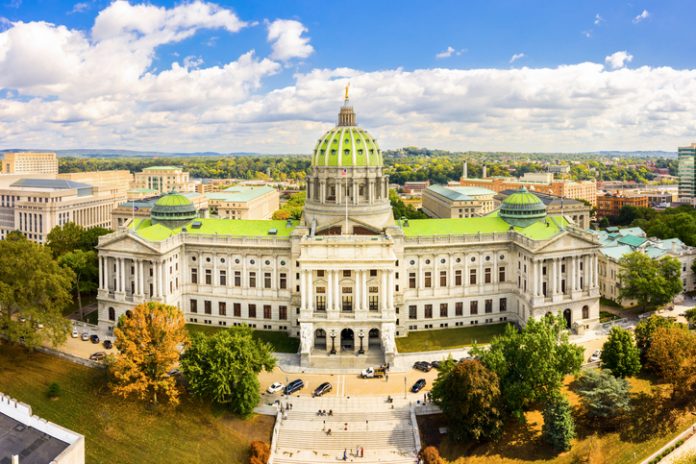By Kevin Mooney
While they were in the majority, Pennsylvania House Republicans spent their political capital to advance American energy independence, free speech rights, and scientific integrity.
Unlike too many their counterparts in Washington D.C., they were not cowed by hostile press coverage or well-funded pressure groups that have a stake in undermining sound science. Most recently, for instance, the House Environmental Resources and Energy Committee held a hearing this fall exploring the benefits of fossil fuels and pitfalls of “emergency declarations” advanced in the name of climate change.
Since Gov. Tom Wolf, the state’s outgoing Democratic governor, first announced back in October 2019 that he was taking executive action to combat climate change, Republican leaders have held a series of hearings calling attention to scientific data that debunks climate alarmism. They have also worked in partnership with Pennsylvania Democrats representing the energy sector to prevent Wolf from circumventing the state legislature along the way toward imposing carbon taxes.
In April, the Pennsylvania Senate fell just one vote shy of the requisite two-thirds majority needed to override Wolf’s veto of a concurrent resolution from the full General Assembly that would prevent the commonwealth from joining the multi-state climate change compact. Three Senate Democrats joined with Republicans in the override attempt. At issue, is the Regional Greenhouse Gas Initiative, commonly known as RGGI, a “cap and trade” regulatory scheme operating under the guise of climate change that is designed to curtail carbon dioxide emissions throughout the 11 participating New England and Mid-Atlantic states. Government regulators in the RGGI states require electric power plants with a capacity of at least 25 megawatts to purchase carbon allowances at quarterly auctions whenever utilities surpass the greenhouse gas initiative’s predetermined cap on Co2 emissions. Speculators have latitude to resell allowances at higher prices. The auction process, which has been in motion since 2009, is where carbon taxes enter the equation. State Rep. Jim Struzzi, a Republican in Indiana County, explains why.
“RGGI is a tax,” Struzzi said in an interview. “It taxes the carbon dioxide emissions that come from plants anytime they are generating electricity and so basically it punishes these companies for being successful by creating the electricity we need for reliable energy in those cold winter months and hot summer months. If these companies are going to stay in business someone is going to have to pay these costs; and it’s going to be the factories, it’s going to be the consumers, and it’s going to affect everyone.”
Struzzi is the lead sponsor of legislation that would prohibit the governor from joining RGGI and imposing carbon taxes without legislative approval. Wolf vetoed an earlier version of the bill, which seven of his own Democrats co-sponsored on the House side. Wolf is not exactly an outlier among climate change activists in government who are actively working to circumvent the democratic process.
In his testimony before the Pennsylvania House, Marc Morano, the editor and publisher of the Climate Depot website, told lawmakers that he sees a certain parallel between climate change initiatives the COVID-19 lockdowns at all levels of government impacting businesses and schools across the country.
“The Biden administration believes that when democracy fails to achieve its climate goals, it’s time to bypass democracy and Congress and follow the COVID model. Climate activists have lusted after the COVID lockdowns as the model for climate lockdowns,” Morano said. “The plan is to declare a ‘climate emergency,’ toss out elected representatives and follow China’s one-party rule model by implementing energy restrictions through the bureaucracy. They don’t need no stinkin’ democracy. Throughout history, emergency declarations have been used and abused to crush freedom. For those who loved how unelected officials ruled our lives under COVID lockdowns, prepare for the attempts to make climate and energy lockdowns permanent.”
During the same hearing, Kevin Dayaratna, a statistician and data scientist with The Heritage Foundation, presented testimony focusing attention on the “Social Cost of Carbon,” or SCC, which federal regulators define as “economic damages per metric ton of carbon dioxide emissions.” The Biden administration is using the SCC in various climate models to determine the long-term impact of CO2, Dayaratna said. However, these models are based on assumptions that may not square with reality, the Heritage analyst warned. These assumptions tend, for example, to overlook the environmental benefits of Co2 emissions such as the “greening of the planet” that occurred between 1982 and 2009, Dayaratna said. At the same time, the models omit the deleterious effect of regulations that restrict Co2 emissions, he observed. Dayaratna cited figures from the Heritage Foundation that point to a severe economic fallout to U.S. that could result from rejoining the U.N.’s Paris Climate Agreement. By 2040, the U.S. could experience an average employment shortfall of more than 1.2 million lost jobs, loss of income of more than $87,000 for a family of four, and up to a 30% increase in household electricity expenditure, with an aggregate $7 trillion loss in GDP, Dayaratna said.
In Pennsylvania, the state-level outlook is every bit as bleak. The Commonwealth Foundation, a free-market group based in Harrisburg, has just published an analysis that finds RGGI’s “carbon tax regime” could lead to a 114% hike in electricity bills. Although Wolf had Pennsylvania join RGGI this year, the state has not participated in the most recent auctions since Wolf’s executive actions are the subject of legal challenges. Industry and labor groups have filed suit challenging the governor’s ability to act unilaterally on climate change policy as have state senators who have raised questions about the separation of powers. As a solution, the Commonwealth Foundation has proposed passing a constitutional amendment to allow the General Assembly “to disapprove regulations as a check on an agency’s power to restrict energy development in the state.”
Josh Shapiro, the incoming Democratic governor, expressed misgivings about Wolf’s approach toward RGGI while on the campaign trail. Since being elected, he hasn’t made any firm commitments about the state’s future participation. A constitutional amendment offers him a way out.
With his party poised to take a slim majority in the House next year, Shapiro will still need to contend with labor constituents and House Democrats residing in energy producing regions who are opposed to RGGI. Meanwhile, the scientific and economic rationale for the climate change initiative continues to unravel. Gregory Wrightstone, a geologist, and executive director of the Co2 Coalition, has repeatedly informed Pennsylvania House members that CO2 is a “miracle molecule” that greatly benefits humanity and deserves greater appreciation.
“Critics of fossil fuels routinely exaggerate, and sometimes outright fabricate, their negative effects while ignoring altogether their enormous benefits,” Wrightstone said during his latest testimony before the Pennsylvania House.
“Coal and oil fueled the Industrial Revolution, which gave us unprecedented prosperity and health. Together with natural gas, they promise to raise billions of people in developing countries from poverty and deprivation. Modern economies cannot long survive without fossil fuels. In short, we love CO2 and so should you.”
In a victory for free speech, climate skeptics have found expression before the Pennsylvania legislature like they have in few other public venues. In a potential victory for American energy, these same skeptics have also exposed the faulty assumptions underpinning costly regulations while also calling attention to unconstitutional executive actions.











Keep an eye on the EU. The mainstream media (here) in the U.S is continuing to “bury” the ongoing energy crisis in Europe. If a cold winter unfolds, it may well be a DISASTER. The American public needs to be fully aware of the consequences of these ill advised, misguided progressive energy policies. That, and watch New England for a domestic preview. Folks need to wake up. It’s TOO LATE when the lights go out…